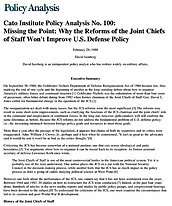The reorganization act dealt with many issues, but the JCS reforms were the most significant.[3] The reforms may result in some short-term improvements, such as clarifying the functions of the JCS chairman and the joint chiefs’ role in the command and employment of combatant forces. In the long run, however, policymakers will still confront the same dilemmas as before, because the JCS reforms do not address the fundamental problem of U.S. defense policy: i.e., the increasing mismatch between foreign policy goals and resources to meet those goals.
More than a year after the passage of the legislation, it appears that claims of both its supporters and its critics were exaggerated. Adm. William J. Crowe, Jr., perhaps said it best when he commented, “It isn’t as great as the advocates said it would be and it won’t be as bad as the critics thought.”[4]
Criticizing the JCS has become somewhat of a national pastime, one that cuts across ideological and party boundaries.[5] Yet arguments about how to organize it can be traced back to its inception. As former assistant secretary of defense Lawrence Korb once wrote,


